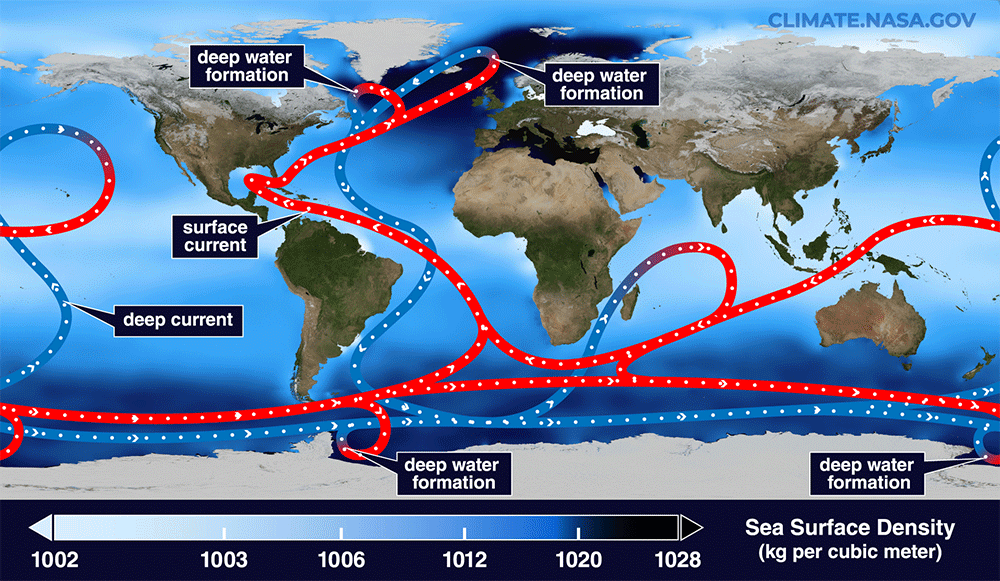Quick Takes and Random Stuff - July 6, 2023
What I found interesting this past week
Ocean currents and why England isn’t colder
Figure 1 is an animated gif from the NASA article Slowdown of the Motion of the Ocean (6/5/2023). Because of the way in which ocean currents distribute heat, England is considerably warmer than one might anticipate given its location so far to the north. The article discusses the science behind the ocean currents, which is all about salt and density, and how scientists have been concerned about the possibility of the system slowing down or perhaps coming to a complete halt.
The good news for now is
Current projections from the IPCC show that the AMOC is unlikely to stop, or collapse, before the year 2100. However, “if such a collapse were to occur," the IPCC says, "it would very likely cause abrupt shifts in regional weather patterns and the water cycle.” These could include “a southward shift in the tropical rain belt, weakening of the African and Asian monsoons, strengthening of Southern Hemisphere monsoons, and drying in Europe,” impacts that would greatly alter food production worldwide.
Who hasn't gotten married by the age of 40?
Pew reports on the increase of those under 40 who have never been married in the article A record-high share of 40-year-olds in the U.S. have never been married (6/28/2023). I don't think that the headline adequately expresses the information that is more interesting in their second graph (seen here). First, the likelihood of a person getting married before the age of 40 increases in proportion to the level of education attained by that person.
The overall decrease in the share of 40-year-olds who have married is especially notable because the share of 40-year-olds who had completed at least a bachelor’s degree was much higher in 2021 than in 1980 (39% vs. 18%). More-highly educated 40-year-olds are more likely to have married, but the growth of this group has not reversed the overall trend of delaying or forgoing marriage.
Second, the rate of people who have never been married is over three times higher among Blacks than it is among Asians and over twice as high as it is among Whites.
Is the world economy becoming unglued?
Our finite world thinks so and lays out a data-based argument in the article The World Economy Is Becoming Unglued; Models Miss Real-World Behavior (6/30/2023):
In my view, the real issue is quite different: Inadequate energy supply of the types the economy requires can be expected to affect the economy in a way that causes it to become “unglued.” The economy will gradually fall apart as infighting becomes more of a problem. Goods won’t necessarily be high-priced; many simply won’t be available at any price. Political parties will fragment. Conflict within countries, such as the recent Wagner conflict with the military leadership in Russia, will become more common.
It has become fashionable to use models to predict the future, but simple models do not consider real-world dynamics. They don’t consider the importance of already existing infrastructure and the types of energy products this infrastructure requires. They don’t consider the importance of continuing food production. They don’t consider the dynamics of “not enough goods and services to go around.”
Even if one disagrees with the article's thesis statement, there is a lot to think about in the points that are brought up in it.
Should higher education departments issue political positions?
This Chronicle of Higher Education article, Where Does Your Department Stand on Abortion? Antiracism? Immigration? (6/26/2023) doesn’t think so.
It may well be naïve to think that a university can ever be a wholly neutral space, and that it can maintain, as the Kalven Report put it, “an independence from political fashions, passions, and pressures.” It is not naïve, however, to recognize that universities host scholars with different, often conflicting beliefs, and that these differences need to be respected and protected. Allowing academic units to issue public statements on current affairs erodes that respect and those protections.
As someone in higher education, I appreciate this.
Hail 1, Solar Panels 0
From Baseball-Sized Hail Smashing Into Panels At 150 MPH Destroys Scottsbluff Solar Farm:
Baseball-sized hail took out a solar farm in Scottsbluff, Nebraska, on Friday.
I’m not a climate denier (see The Three Trends of Climate Change) but I’m still very skeptical that solar and wind will provide sufficient energy (see Seasonal Solar Electricity Generation).
About a Dog
Enough serious stuff. A fun essay: An Unruly Retriever Helps His Owner Exorcise Some Demons - A humorist’s bold attempt to rewrite a family legacy of failed Labradors
The spinning CD
I like music, so I’ll end with what I’m listening to on CD (yes, I still like CDs, and I don’t care what my kids say). Great first single, Rescued, from the very good new Foo Fighters album But Here We Are.
Please Share
Share this post with your friends (or those who aren't friends of yours) and on social media to help get the word out about Briefed by Data. You may follow me on Twitter at BriefedByData. Send me an email at briefedbydata@substack.com if you have any suggestions for articles, comments, or thoughts. Thanks. Cheers, Tom.




